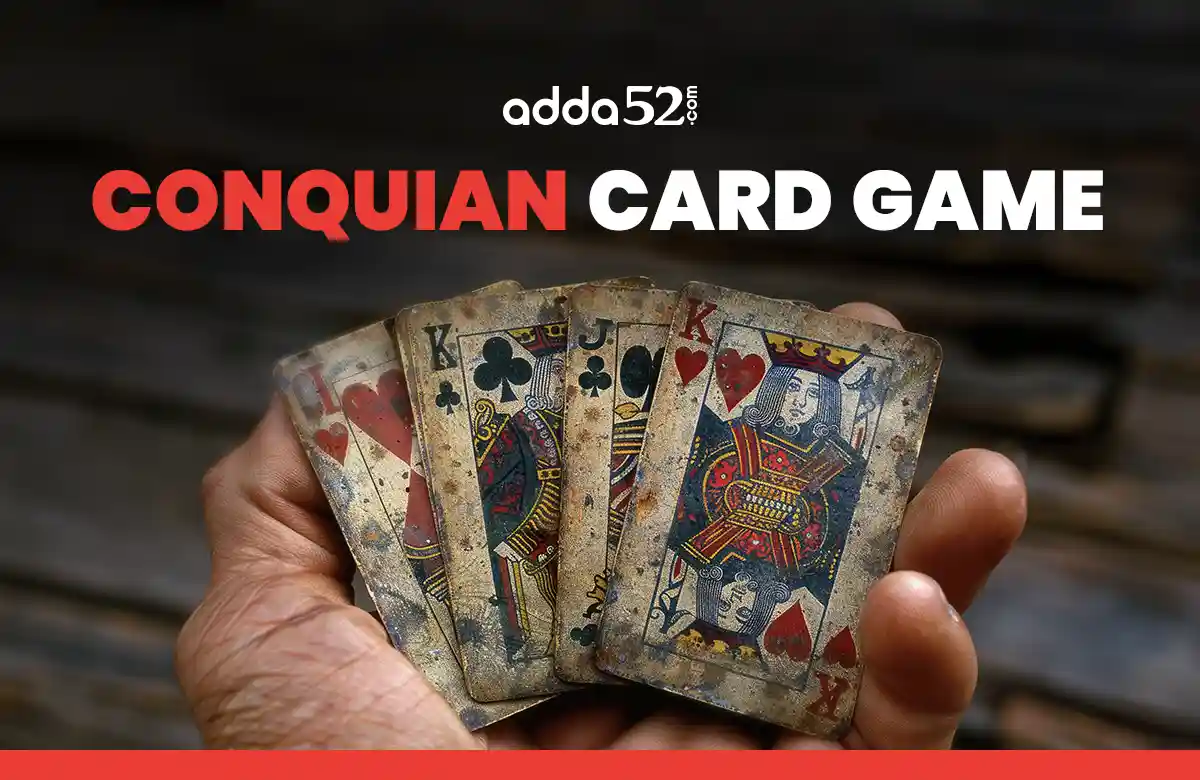
Introduction
Conquian is one of the oldest Rummy-style card games. It is considered the ancestor of modern Rummy games like Gin and Canasta. It is traditionally played with a Spanish deck of 40 cards. A standard 52-card deck can also be used by removing the 8s, 9s, and 10s, leaving a 40-card deck.
Objective
The objective of Conquian is to be the first to meld 11 cards in valid combinations (either sets of 3 or more cards of the same rank or runs of 3 or more consecutive cards of the same suit).
How to Play Conquian Card Game
Deck: Use a 40-card deck. To create this deck, eliminate the 8s, 9s and 10s from a deck of cards to obtain Ace (low) through 7 and face cards like Jack, Queen and King.
Players: Conquian is typically played with 2 players.
Deal: Shuffle the deck and deal 10 cards to each player. The remaining cards form the draw pile and are placed face down.
Starting the Game:
- The non-dealer (or player to the dealer's left) goes first.
- Turn over the draw pile's top card and place it beside it to start the discard pile.
Melding:
- A player can create melds with their cards by forming:
- Sets: Three or four cards of the same rank (e.g., three Kings).
- Runs: Three or more consecutive cards of the same suit (e.g., 5, 6, 7 of Hearts).
- Melds are placed face-up on the table.
Taking a Card:
- On their turn, a player has the option to:
- Draw a card from the draw pile, OR
- Pick up the top card from the discard pile.
- If a player picks up a card from the discard pile, they must immediately use it to form a meld or add it to an existing meld.
Discarding:
- After drawing or picking up a card and attempting to form a meld, the player must discard one card to the discard pile.
- The discard must be a card the player cannot use to form a meld.
Using Opponent's Discards:
- If your opponent discards a card that you can use to form a meld, you may pick it up, but you must use it immediately to form a meld.
Winning the Game:
- The first player to successfully meld all 11 cards wins the game.
- If the draw pile is exhausted before a player wins, the discard pile is reshuffled and placed as the new draw pile, and the game continues.
Conquian Rules
- Ace is Low: In Conquian, Aces are always low, so a run like Ace, 2, 3 is valid, but Queen, King, and Ace are not.
- You Cannot Go Out on a Draw: A player cannot win by drawing their final card. They must be able to go out with a discard.
- No Jokers or Wild Cards: Conquian is typically played without jokers or wild cards.
Example of Conquian
- Player A draws 5 of the Diamonds.
- Player A has 6 of Diamonds and 7 of Diamonds in his hand, so he uses the 5 of Diamonds to form a run (5, 6, 7 of Diamonds).
- He discards 2 of the Clubs that he does not need.
- The game ends when he successfully melds all his cards, leaving him with no cards in hand after discarding them.
Strategies to Win in Conquian Card Game
Here are some advanced strategies that can improve your chances of winning:
Focus on Melds Early
- Prioritize Melds: Always prioritize forming melds (sets or runs) early in the game. The quicker you form them, the fewer cards you need to win. Keep track of which cards are available and plan your melds accordingly.
- Flexible Plans: Be flexible with your melds. If you aim to form a certain meld but the necessary cards are not showing up, be ready to switch strategies and pursue a different one.
Track Discarded Cards
- Memory and Card Counting: Take note of the cards you and your opponent have already discarded. Doing so can provide insight into which cards are still in play, allowing you to anticipate their actions more accurately.
- Analyze Opponent’s Strategy: If your opponent discards a card you require, note that this could imply they intentionally avoid forming a particular meld and can help reveal their tactics.
Bluff with Discards
- Misdirection: Discard cards that can mislead your opponent. If you are close to completing a meld, discard a card that suggests you are not pursuing that particular set. This can confuse your opponent and lead them to discard your needed card.
- Create Opportunities: If you suspect your opponent requires a particular card, dispose of a card that could cause them to reconsider their pursuit of the meld. This move may compel them to modify their strategy.
Hold Key Cards
- Delay Meld Completion: If you have a key card that could help complete a meld but is not urgent, hold onto it to avoid giving away your strategy too early. This can give you more time to assess your opponent's hand.
- Control the Game Pace: Holding onto key cards can also allow you to control the game's pace, forcing your opponent to take risks or make suboptimal plays.
Play Defense
- Block Opponent’s Melds: To disrupt the plans of your opponent gathering cards of a particular suit or rank, strategically retain those cards in your hand or discard them at opportune times.
- Sacrifice for Long-Term Gain: Focusing solely on your hand is beneficial in the long run. This sometimes involves sacrificing a potential meld to prevent your opponent from completing theirs.
Optimize Card Exchanges
- Efficient Swaps: When swapping cards, maximize every trade. Consider how the card you are receiving can aid in creating a new meld or finishing an existing one.
- Limit Unnecessary Exchanges: Avoid unnecessary card exchanges that could give your opponent insights into your hand. Only swap cards when it is truly advantageous.
End the Game Quickly
- Close Out When Possible: -If you see an opportunity to win, take it. Don’t overextend by trying to create the perfect hand—ending the game quickly can prevent your opponent from catching up.
- Maximize Points: If you are playing a scoring variant of Conquian, consider the point value of your cards and melds. Ending the game with high-value melds can be as important as winning the round.
Adapt to the Opponent
- Observe Playing Style: Different opponents have different strategies. Your strategy must be adapted to your opponents' aggressive or conservative tendencies. Make necessary adjustments as required.
- Exploit Weaknesses: If you notice a pattern or a mistake in your opponent’s play, capitalize on it. Every small advantage counts in Conquian.
Stay Calm and Patient
- Avoid Impulsivity: In Conquian, the key to success lies in patience. Waiting for a strategic opportunity and making a confident move is usually more beneficial than hastily taking action.
- Keep Emotions in Check: Don’t let frustration or excitement dictate your actions. Stay focused and stick to your strategy, adjusting only when necessary.
Frequently Asked Questions
How do you win in Conquian?
To emerge victorious in Conquian, one must meld all 11 cards into sets or runs- valid combinations. A player accomplishes this by drawing and discarding while simultaneously creating three-of-a-kind sets or consecutive runs from the same suit.
What are valid melds in Conquian?
In Conquian, valid melds consist of either sets or runs. A group with three or more cards with the same rank is called a set (ex., 3 Kings). Conversely, if three or more cards of the same suit are lined up in a series, it is called a run (for instance, Hearts 5-6-7). Runs can start with an Ace and include numbers two through three but must not end with Queen-King-Ace since Aces rank as low.
Can you play Conquian with more than 2 players?
Although designed for two players, Conquian can accommodate multiple participants. A three-player game involves dealing 9 cards to each player, whereas in a four-player setting, the number of cards dealt is 8 per person. Teams are formed and seated directly across from their respective partners when played with four individuals.
Conclusion
The timeless game of Conquian requires both strategy and skill. As a predecessor to modern Rummy games, it offers a unique gaming experience that is still enjoyed by many today. This great opportunity allows you to test your ability to form winning combinations and outsmart opponents. The game's timeless nature is due to its simplicity yet depth, making it suitable for players of all skill levels.
